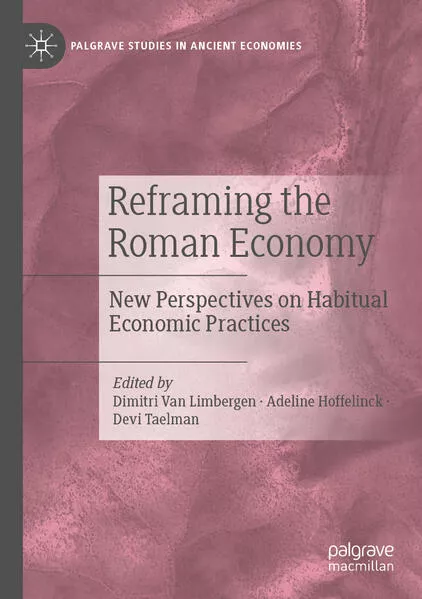
- Publikationen ca: 3
- Fragen & Antworten
Dimitri Van Limbergen
Dimitri Van Limbergen is a researcher at Ghent University, Belgium. His main areas of study are Roman archaeology and economic history.
Adeline Hoffelinck is a researcher at Ghent University, Belgium. She researches the transformation of commercial infrastructure in Roman cities during their urbanization.
Devi Taelman is a researcher at the Vrije Universiteit Brussel, Belgium. He is interested in the study of the economy of ornamental stones used in antiquity, and in human-environment interactions in Roman Antiquity.
Reframing the Roman Economy
This book focuses on those features of the Roman economy that are less traceable in text and archaeology, and as a consequence remain largely underexplored in contemporary scholarship. By reincorporating, for the first time, these long-obscured practices in mainstream scholarly discourses, this book offers a more complete and balanced view of an economic system that for too long has mostly been studied through its macro-economic and large-scale – and thus archaeologically and textually omnipresent – aspects.
Reframing the Roman Economy
This book focuses on those features of the Roman economy that are less traceable in text and archaeology, and as a consequence remain largely underexplored in contemporary scholarship. By reincorporating, for the first time, these long-obscured practices in mainstream scholarly discourses, this book offers a more complete and balanced view of an economic system that for too long has mostly been studied through its macro-economic and large-scale – and thus archaeologically and textually omnipresent – aspects.
Reframing the Roman Economy
This book focuses on those features of the Roman economy that are less traceable in text and archaeology, and as a consequence remain largely underexplored in contemporary scholarship. By reincorporating, for the first time, these long-obscured practices in mainstream scholarly discourses, this book offers a more complete and balanced view of an economic system that for too long has mostly been studied through its macro-economic and large-scale – and thus archaeologically and textually omnipresent – aspects.


